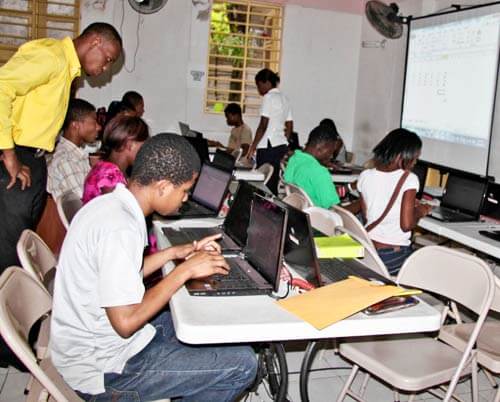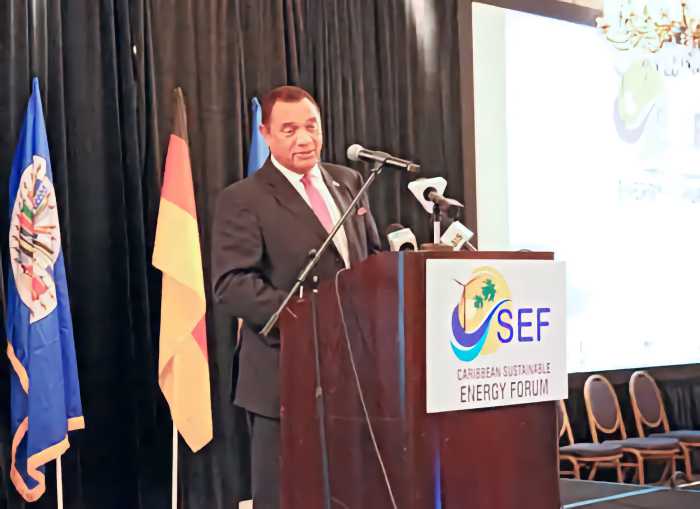The HELP–Haitian Education Leadership Program center in the calm residential Pacot neighborhood of Port-au-Prince is a beehive of activity. In a sheltered outdoor backyard structure, university students (outside of school) struggle with English instruction. Inside, crammed together desks with laptops provide the equipment for learning computer programs.
In the early evenings–it gets dark at 5:30 p.m.–topical talks, like GARR’s Colette Lespinasse’s presentation on Dominicans of Haitian ancestry being stripped of their citizenship, are given as part of leadership training that also includes exercises in being straight forward and being able to talk truthfully about oneself.
The merit- and need-based HELP scholarship program for excelling Haitian high school graduates with no resources has come a long way since a number of American friends in 1996 pooled money in order that Ismonde Joseph could study to be a doctor. And she is one.
Progressively adding more scholarship recipients, HELP boasts 65 graduates and this year, has over 100 university students in 4- or 5-year programs studying an array of subjects.
HELP weathered the 2010 earthquake but lost two of their students. Their Turgeau, Port-au-Prince headquarters was irretrievably damaged.
When the universities were closed for five months and not to be idle, HELP students volunteered in the tent camps until the universities reopened.
Seven years ago, Garry Delice joined HELP as director leaving his teaching job at Louverture Cleary School in Croix des Bouquets where he taught history and geography.
Reviewing a graduating student’s thesis, a function he often fulfills along with HELP thesis coordinators, he took time to share thoughts. (Delice was reading Nemdia Daceney’s (studying economics) 76-page thesis on the treatment of workers in the Ouanaminthe free zone. HELP students defend their thesis before a HELP advisor and student committee prior to their defense at the university).
“There are two major challenges, I identify,” he said. “Advising students is complex, not just academic but social and in the context of Haiti. It is a problem to get good student advisors; this isn’t something one studies in school, although there is a degree in education.”
He explained how 65 percent come from the provinces, where they very actively recruit. These students need guidance in adaptation and integration to life in the very urban Port-au-Prince and life within the HELP structure.
Away from family and a different way of life is very difficult. “The first year is hard for everyone,” two young men, one from St. Marc studying pharmacy and the other from Gonnaives studying computer science later agreed.
Also, continued Delice, “We are challenged in how we fulfill our mission to contribute to a more just society in Haiti. It’s not just about helping educate (train) the students.”
“There needs to be a project students work on together to help build a strong sense of social commitment,” he said. “I want to make students aware of the situation in Haiti.” In a previous project, 10 HELP students taught in Cite Soleil.
Delice emphasized that “after they graduate, they all go their separate ways” and it was important that they be part of change once outside of HELP.
Another reflection Delice offered was how HELP doesn’t want “to create a border between students past and their situation at HELP.” He doesn’t want students to be alienated from their past.
On graduating, all HELP students get jobs, employed in the private sector, government, and NGOs. Many Haitian businesses are bristling to get qualified Haitians to hire (particularly, management) now filled by Dominicans and Filipinos, for example.
When HELP started, it only paid school fees and books. Now three nearby large homes house about 80 students.
HELP pays tuition, housing, and a small stipend for food and incidentals, nurtures, advises and has career services for its students.
To stretch HELP’s resources, since 2010, students sign contracts that once employed, they will return back to HELP 15% of their revenues for nine years.
U.S. Secretary of Education Arne Duncan recently visited HELP and Bill Clinton is among many others who recognize HELP for its outstanding work.

Photo by Tequila Minsky



























